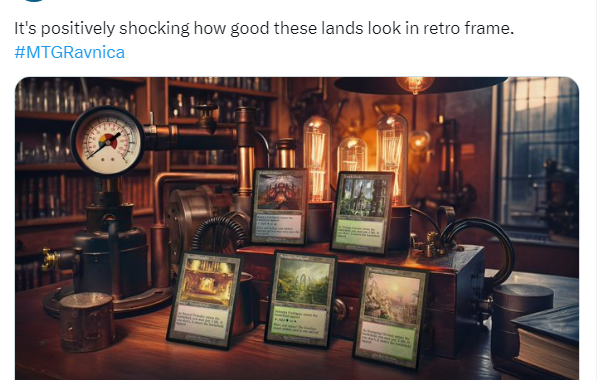Wizards of the Coast, the company behind Magic: The Gathering (MtG), has issued an apology for releasing a promotional image that utilized artificial intelligence tools in its creation. Despite having a policy in place prohibiting the use of AI in artwork, an exception was made in this instance, sparking discussions that have prompted at least one Magic artist to publicly announce their disassociation from the company.
The promotional image in question showcased five new “retro frame” versions of lands from the upcoming Ravnica Remastered set within a steampunk-style laboratory setting. While initially appearing unassuming, closer inspection revealed anomalies in the background elements of the lab, indicative of AI-generated art. It is important to note that the authorship of the artwork featured on the cards themselves has not been called into question.
For enthusiasts of Magic: The Gathering, a community accustomed to the distinctive work of numerous artists contributing to the game’s visuals, the revelation of AI involvement in this instance is particularly disconcerting. Wizards of the Coast has emphasized the importance of adhering to artist guidelines that explicitly prohibit the use of AI tools in the creative process, especially following a prior incident involving a Dungeons & Dragons (D&D) artist utilizing AI for commissioned artwork.
Despite public reassurances from Wizards of the Coast that artists must refrain from employing AI technologies in crafting Magic products, concerns resurfaced with the recent promotional image controversy. The company defended its stance, asserting that the art was exclusively human-made and not AI-generated. However, these claims were challenged as speculations regarding AI utilization persisted throughout the day.
In response to the unfolding situation, veteran MtG designer Dave Rapoza expressed his disillusionment by declaring his decision to cease working for Wizards of the Coast. He underscored the importance of upholding principles and transparency in artistic practices, emphasizing the need for integrity in creative endeavors.
In a subsequent social media post, Wizards of the Coast acknowledged their error in previously denying the use of AI in the promotional image. The company clarified that while the artwork was sourced from an external provider, it did incorporate elements generated by AI tools, which have become increasingly prevalent in industry-standard software like Photoshop.
Despite this clarification, Rapoza remained steadfast in his decision to discontinue collaboration with Wizards of the Coast, awaiting further developments in the unfolding situation. The controversy has prompted reflections within the artistic community on the challenges of enforcing a blanket ban on AI-generated art, especially within larger institutions that engage with a diverse pool of artists and vendors.
Freelance MtG designer Jason Rainville highlighted the evolving landscape of art creation, noting the growing difficulty in distinguishing AI-generated content as technology advances. The incident serves as a poignant reminder of the complexities inherent in balancing artistic integrity with technological advancements within the creative industry.






